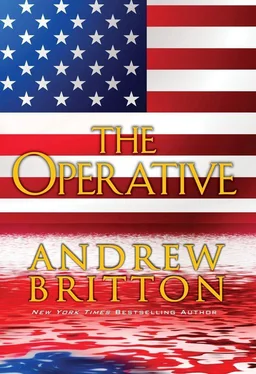Andrew Britton - The Operative
Здесь есть возможность читать онлайн «Andrew Britton - The Operative» весь текст электронной книги совершенно бесплатно (целиком полную версию без сокращений). В некоторых случаях можно слушать аудио, скачать через торрент в формате fb2 и присутствует краткое содержание. Жанр: Триллер, на английском языке. Описание произведения, (предисловие) а так же отзывы посетителей доступны на портале библиотеки ЛибКат.
- Название:The Operative
- Автор:
- Жанр:
- Год:неизвестен
- ISBN:нет данных
- Рейтинг книги:5 / 5. Голосов: 1
-
Избранное:Добавить в избранное
- Отзывы:
-
Ваша оценка:
- 100
- 1
- 2
- 3
- 4
- 5
The Operative: краткое содержание, описание и аннотация
Предлагаем к чтению аннотацию, описание, краткое содержание или предисловие (зависит от того, что написал сам автор книги «The Operative»). Если вы не нашли необходимую информацию о книге — напишите в комментариях, мы постараемся отыскать её.
The Operative — читать онлайн бесплатно полную книгу (весь текст) целиком
Ниже представлен текст книги, разбитый по страницам. Система сохранения места последней прочитанной страницы, позволяет с удобством читать онлайн бесплатно книгу «The Operative», без необходимости каждый раз заново искать на чём Вы остановились. Поставьте закладку, и сможете в любой момент перейти на страницу, на которой закончили чтение.
Интервал:
Закладка:
But hollow, she thought. You could sum them up in a brochure. They weren’t conflicted, the way Ryan Kealey was, yearning for peace but missing the thrill of the hunt, walking chastely beside her yet caring deeply and wanting more.
She hugged Kealey’s arm a little tighter, cherishing the prolonged contact, and quietly thanked God for the good that came with the bad. It didn’t make life easy, but they at least could actually hold each other.
And walk away from the fish tank.
The petite woman with short dark hair and Asian eyes approached room 306 of the Baltimore Hilton. There was a DO NOT DISTURB sign on the door handle. She ignored it and swiped her key card, entering the large, modern room with its panoramic view of the city’s Inner Harbor.
The harbor had come a long way since its taxpayer-paid restoration in the early eighties. Much like Times Square, prostitutes and crackheads were “relocated” or arrested, and their tainted syringes and condoms, which clung to the grates of gutters, were finally cleaned out. Warehouses, crack dens, rotting fuel tankers, and out-of-favor dog tracks were replaced by new shopping malls, fine dining, a world-class aquarium, and a new convention center. These improvements helped draw other corporate entities back into the suddenly decorous setting, bringing tourists and families back into the historic marina and closer to its famous “star-spangled” Fort McHenry. And thanks in part to hometown hero Cal Ripken, Jr.-and his just over 2,000 consecutive played games record, which was quickly sneaking up on record holder Lou Gehrig’s 2,130 games-the Baltimore Orioles got their new brick Camden Yards stadium in the early nineties, nearly completing the once-sagging city’s late twentieth-century facelift.
But somehow, unlike Midtown Manhattan’s redo, no matter how many distractions and special events tried to cover up Baltimore’s seamy history, echoes still hummed from the still neglected canneries lining the shore, from years upon years of painfully obtained sugarcane and oysters-turned-mother-of-pearl that were toiled through and exported by gifted, poorly paid women who needed pennies for provisions and by skilled slaves who sorely needed their autonomy liberated, as is memorialized in the often sightseer-slighted Museum of Industry.
The woman put away her key card as the door clicked shut behind her, went to the dresser, and opened the second dresser drawer from the bottom. She withdrew a black, satchel-style photographer’s bag, pulled it up by the strap, and hefted it over her shoulder. With its bulky contents, it weighed between 5 and 6 pounds, which was substantial but not heavy enough to make carrying it difficult.
She wore a sleeveless champagne-colored blouse and black Capri pants with a damask rose printed on the right outer thigh, and had a wireless mobile headset on her right ear. She also wore trendy sixteen-button gloves. In her line of work, she thought, women had two advantages: they could get close to men of influence, and it was easy not to leave fingerprints.
My line of work, twenty-one year-old Jasni Osman reflected bitterly.
Three years ago, the gifted gymnast was training for the Singapore Youth Olympics. All she had ever wanted was to express herself in movement, revel in the joy of being free. Then her eldest brother, Yusuf, a journalist, was arrested for what the ruling People’s Action Party termed radical activities and sentenced to thirty years in prison. He suggested from his prison cell that she could help him by attending a meeting of Jamaah Anshorut Tauhid at a local mosque. Although she had to pray apart from the men, in keeping with strict tradition, the organization’s religious instructors fully welcomed her as a daughter of Islam, instructing her on the lies and deceit of their government’s rulers and the hateful imperialism of their masters, the United States.
Seven months later she was arrested in a raid on a JAT camp at Aceh, Indonesia, accused of being a courier of illegal funds. Her captors were American agents, and she vividly recalled the terrible place to which she was brought in Jakarta, the suffocating torture by the CIA, the brutal sodomy committed by the BIN, the state’s fearful Badan Intelijen Negara. Before her arrest, she had been interested only in bringing down the PAP and freeing her brother. Now she wanted jihad against all oppressors of the Muslim people.
Captivity and restraint were unthinkable to Jasni. It took repeated assaults from the BIN, in her cell, for Jasni to locate and steal the key to the restraints of the waterboard. After a near drowning the Americans left her-and she escaped, using her flexibility to hide and then to cling to the underside of the very nondescript scout vehicle they were using to hunt her. She returned to the mosque, committed to jihad, and was assigned by JAT leader Al Su’al to Alef, the group responsible for bringing bloodshed to the American homeland.
Today she would honor all those who had helped her on her journey-and her brother, who was still languishing in that filthy prison.
Before leaving the room, she slipped two fingers into the front change pocket of her Capris, extracted a red glass marble. She held it for a moment, enjoying its smooth, cool exterior and the strange heart that seemed to beat within. A sense of well-being permeated her, and she reluctantly put it in the drawer. Then she pushed the drawer shut, adjusted the satchel so it hung more comfortably on her shoulder, and bowed her head.
Oh, Allah, I will infiltrate the enemy and kill them without fear of death.
Jasni Osman left the room and went downstairs. Soon afterward a young male stepped from the elevator. Wearing a navy blue sports jacket and dark trousers, he used his key card to enter the room and took his specified package from the dresser.
It was shortly after 5:00 p.m. when he dropped his colored marble in the drawer and exited.
The order to strike would come over the headset exactly thirteen minutes later.
Colin Dearborn frowned as he got on the fast-food line at the rear of the convention center. Almost fifteen bucks for a chili dog, a side-chips or fries or a paper cup of slaw-and a Coke was nuts. The disorganized mass of customers, paying more attention to their cell phones than to the lines, and the glacially slow service didn’t help.
Faced with the prospect of languishing there awhile, Colin slid his smartphone from his pants pocket to tweet his displeasure. As a contributing editor to the Cavalier, UVA’s student newspaper, he’d been an enthusiastic champion of fully integrating the grid into its content delivery model. While he wasn’t among the hard-core geeks who insisted print journalism was dead, it had clearly become the lowest-growth segment of a broader information market.
He opened his Twitter application and thought a moment, smoothing his chin beard between his thumb and forefinger. Getting his message across in 140 characters or less was an enjoyable challenge. In a sense it was like composing a haiku; you had to be super clear and tight with your writing.
His thumbs rapidly flurried over his touch pad as he typed: #Food vendors// This is a career fair. We r here looking 4 #JOBS//. #Affordable // hot dogs wanted. Lower prices, plz
Finishing the update, Colin scrolled down his timeline to check the responses to his earlier tweets and smiled to see one his aunt had pecked out minutes before: On way from aquarium w/RK. Bringing u jellyfish burger. Lettuce, tomato, fries. Pick tentacles w/stingers out b4 you eat.
Colin considered calling her the old-fashioned way so he could ask her to bring something to eat, but he figured he might miss her, anyway. He’d turned the volume down on his phone so it wouldn’t sound in the middle of the interviews he had been conducting with company recruiters and potential employees, all of which would be used to write his story for the school paper.
Читать дальшеИнтервал:
Закладка:
Похожие книги на «The Operative»
Представляем Вашему вниманию похожие книги на «The Operative» списком для выбора. Мы отобрали схожую по названию и смыслу литературу в надежде предоставить читателям больше вариантов отыскать новые, интересные, ещё непрочитанные произведения.
Обсуждение, отзывы о книге «The Operative» и просто собственные мнения читателей. Оставьте ваши комментарии, напишите, что Вы думаете о произведении, его смысле или главных героях. Укажите что конкретно понравилось, а что нет, и почему Вы так считаете.












